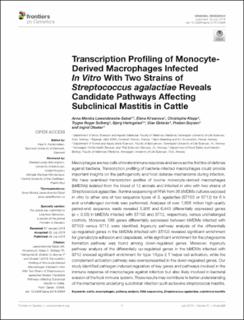Transcription Profiling of Monocyte-Derived Macrophages Infected in vitro with Two Strains of Streptococcus agalactiae Reveals Candidate Pathways Affecting Subclinical Mastitis in Cattle
Lewandowska-Sabat, Anna; Kirsanova, Elena; Klopp, Christophe; Solberg, Trygve Roger; Heringstad, Bjørg; Østerås, Olav; Boysen, Preben; Olsaker, Ingrid
Peer reviewed, Journal article
Published version

View/
Date
2019Metadata
Show full item recordCollections
Original version
10.3389/fgene.2019.00689Abstract
Macrophages are key cells of innate immune response and serve as the first line of defense against bacteria. Transcription profiling of bacteria-infected macrophages could provide important insights on the pathogenicity and host defense mechanisms during infection. We have examined transcription profiles of bovine monocyte-derived macrophages (bMDMs) isolated from the blood of 12 animals and infected in vitro with two strains of Streptococcus agalactiae. Illumina sequencing of RNA from 36 bMDMs cultures exposed in vitro to either one of two sequence types of S. agalactiae (ST103 or ST12) for 6 h and unchallenged controls was performed. Analyses of over 1,656 million high-quality paired-end sequence reads revealed 5,936 and 6,443 differentially expressed genes (p < 0.05) in bMDMs infected with ST103 and ST12, respectively, versus unchallenged controls. Moreover, 588 genes differentially expressed between bMDMs infected with ST103 versus ST12 were identified. Ingenuity pathway analysis of the differentially up-regulated genes in the bMDMs infected with ST103 revealed significant enrichment for granulocyte adhesion and diapedesis, while significant enrichment for the phagosome formation pathway was found among down-regulated genes. Moreover, Ingenuity pathway analysis of the differentially up-regulated genes in the bMDMs infected with ST12 showed significant enrichment for type 1/type 2 T helper cell activation, while the complement activation pathway was overrepresented in the down-regulated genes. Our study identified pathogen-induced regulation of key genes and pathways involved in the immune response of macrophages against infection but also likely involved in bacterial evasion of the host immune system. These results may contribute to better understanding of the mechanisms underlying subclinical infection such as bovine streptococcal mastitis.
